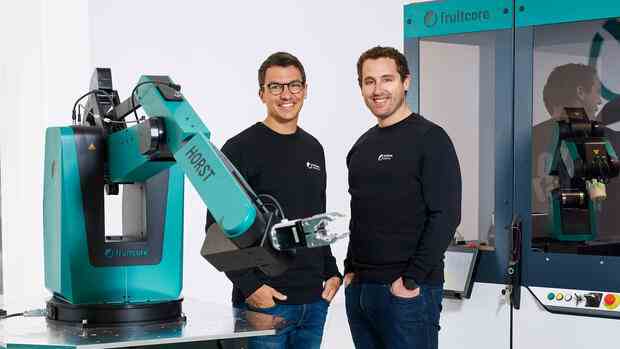Dusseldorf Horst is popular with the 35 employees of the medium-sized company Roth & Effinger. The colleague is very diligent, since 2020 he has been doing boring work without grumbling. Every 40 seconds, Horst places laser-cut sheet metal parts on a deep-drawing press, which forms the sheet metal. Horst hands this over to a drill. He does this up to 120,000 times a year, resulting in so-called flange plates.
Horst is just an acronym for “Highly Optimized Robotic Systems Technology” – Horst 900 is a machine. “We are very satisfied, the robot works perfectly,” says Marius Effinger, product manager and member of the management of the company on the edge of the Black Forest.
It is the first robot from the small manufacturing manufacturer Roth & Effinger. And one who comes directly from the neighborhood. Horst is built in Villingen by the Fruitcore company. It’s only been around for five years, it’s been producing robots for two years – but there are already up to 800 robots in use in industrial production.
Takeover offers from Switzerland or China
The business idea is well received: to build comparatively affordable and powerful robots for medium-sized companies. According to the Federal Statistical Office, only four percent of all companies with ten or more employees in Germany use an industrial robot.
Top jobs of the day
Find the best jobs now and
be notified by email.
“We fill a gap between expensive industrial robots and cheaper but not as powerful cobots,” says Jens Riegger, CEO and co-founder of Fruitcore. “We want to bring robots to the masses.”
The interest is great. Fruitcore rejected takeover offers from Switzerland, China and corporations. Now the company is raising around 23 million euros from venture capitalists such as UVC Partners and Capricorn. “We want to build an integrated robot manufacturer that could become a billion-dollar company,” says Benjamin Erhart, partner at UVC. That would take a long time, but Fruitcore has an edge over other companies when it comes to software and hardware.
Fruitcore boss Riegger is a little more down-to-earth with his hopes for the future and speaks of a production of more than 10,000 robots in three to four years. “The shortage of skilled workers is playing into our hands,” says Patrick Heimburger, Chief Revenue Officer at Fruitcore. “We have clients who are facing unimaginable problems and just can’t fill all the jobs.”
“Strong cost advantage and unique position”
The success is based on a small and affordable robot family. The smallest Horst 600 cost a little more than 11,000 euros, the most powerful Horst 1400 just under 18,000 euros. There are also services and software features.
The company secured its innovations with around 20 patents. The most important of these is the gearbox: Horst can reach a long way for his size and lift heavy loads. “The intelligent arrangement of so-called stepper motors, planetary gears and four-bar chains enable a strong cost advantage and a unique position,” says Werner Kraus, robotics expert from the Fraunhofer Institute for Manufacturing Engineering and Automation (IPA).
The industrial robot loading and unloading a milling machine – depending on the model, Horst costs a maximum of 18,000 euros plus software and service.
“This is a great product with a great positioning,” says Helmut Schmid, board member of the German Robotics Association. Schmid’s praise counts for something, he also runs the Western European business of Universal Robots, indirectly a competitor.
Schmid as well as production manager Effinger praise the easy start-up of Horst. Weeks of employee training are required for industrial robots from leading suppliers. At Fruitcore, a few hours of video training is enough. Device, control, operating system and app have all been developed by Fruitcore itself and harmonize accordingly.
In the medium term to the USA
At Fruitcore, the signs point to growth. So far, the company has around 500 customers, most of whom come from Germany and the surrounding countries. The company now wants to use the investor money to expand its sales network, and in the medium term it also wants to expand into the USA.
“Despite the small number and high quality, we can ask for a low price. If we ramp up the volume, it’s going to be scary – that’s how much we can lower the price,” says Fruitcore boss Riegger.
The manufacturing manufacturer Roh & Effinger is definitely a fan, and not just because of the price. The name is also popular. “Our employees have now christened our hydraulic press Hilde,” says production manager Effinger. Horst places his trays in them: “Horst and Hilde work hand in hand.”
More: Shortage of skilled workers and energy crisis: medium-sized companies are showing increasing interest in robotic solutions
